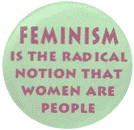 My reasons were always inchoate and would have remained so but for Jane Galt who pointed to a "feminist rant" at Todd Seavey Much as I like and respect Jane, I would have called what Todd posted a polemic rather than a rant.
My reasons were always inchoate and would have remained so but for Jane Galt who pointed to a "feminist rant" at Todd Seavey Much as I like and respect Jane, I would have called what Todd posted a polemic rather than a rant.In any case, there is a long and highly charged commentary thread at the end of the piece and the whole radical notion came up--more on this later, but for the moment let us just say it reminded me of the slogan.
So, what is wrong with the slogan? I guess what I don't like about it is that it is pretty obviously dishonest.
1. Since everybody thinks that women are people, it is not a radical notion at all. It is better described as common sense or just obvious.
2. Feminism goes well beyond this little "radical notion". If it didn't then everyone would be a feminist and the whole exercise would be pointless.
3. If feminists really believe that it is radical to believe that women are people, then logically they must believe that most people disagree with the statement since a thing is only radical when a small minority believe it. It follows then, that they are either paranoid or very much out of touch with reality.
I always figured that not even the most radical feminist would actually believe the slogan on the button. It was just a bit of strategy: Any fair minded person would agree that women are people and thus feel good about the idea of feminism.
Now we get back to Todd Seavey's post: In the thread, someone asked what it would take for (another poster) to allow that women are people?
Here is the response...
I’m genuinely curious: What, exactly, would have to change for you to believe that “society” *did* behave as if women were people? I’m not Red Stapler, but I’ll take a crack at this. A society — and by this I mean, approximately, the prevailing attitudes and practises in the United States, since that’s where I live — where women were treated like people, like equals, would look something like this to me: We’d have an approximately equal number of male and female presidential candidates. And Supreme Court nominees, and congresspeople, and state governors… An equal number of men and women would be raped every year (and that number would, I’m guessing, be rather smaller than it is now). Ditto the numbers on sexual violence perpetrators. If there were a disagreement on the consensuality of a sexual act, one party’s word would not be taken over the other’s as a matter of course without other evidence. Advertisements would be equally as likely to use a man as a woman in an attempt to use sex to sell the product, and they’d be dressed equally skimpily. There would not be a significant difference in pay between women and men, overall. I’m not saying all jobs would be evenly split between the genders, but that if you took a slice of people doing similar (education requirements, position in the company heirarchy, experience generally required to reach that position, etc) work, you wouldn’t see a difference in pay between men and women. And that the “most traditionally female” jobs would not pay, as a rule, less than the ones with the most men working them. One would be equally likely to encounter women as men at any point in a given hierarchy, and as many men would have a female boss as women would have a male one. It would be equally normal for a man as a woman to be the stay-at-home parent. Women would not be discriminated against in hiring because it was assumed that they would take time off or leave to have children. Women and men who chose to have a lot of casual sex would generally be treated equally because of it. Ditto people who chose to have no sex. Both sexes would receive equal education on and be considered to bear equal responsibility for practicing safer sex. I’m sure there are several more important things that would be different in a country or world where we behaved like the genders were differentiated mostly by their plumbing and not by their intrinsic social status, but I can’t think of them at the moment. I hope these provide food for thought on the ways in which women are *not* treated like this right now in the US, and why that might be. Allie | 7:35 am on the 25th of April, 2007I guess it is really a radical notion after all! I just didn't realize that by women = people, what they actually meant was complete acceptance of a fairly comprehensive agenda that most people would not agree to.
They were honest after all, you just have to know their code.
dbp












